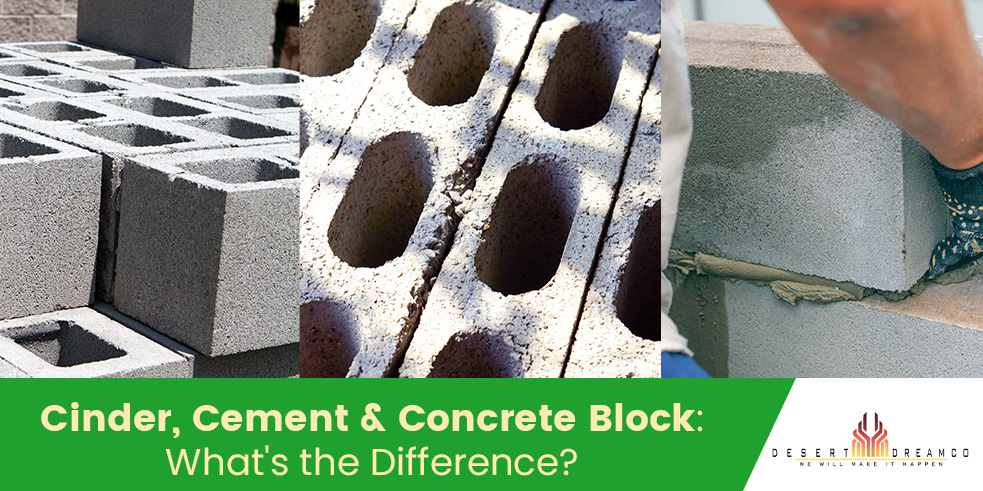Cinder, Cement, and Concrete Block: What’s the Difference?
Did you know that block walls are some of the most common forms of fences in Phoenix, and they are here to stay!
When you are planning a construction project, it’s not uncommon for people to ask about the building materials and more specifically what kind of block is being used, and often people ask if it is cinder block, cement block, or concrete block. Seems like a valid question, right?
Well, all of these are unique, so let’s dive into what the differences are so you can understand what is best for your project.
Below, we discuss the differences between cinder, cement, and concrete block so that you can make an informed decision!
What Is a Cinder Block?
By definition, a cinder block is a rectangular block made of concrete and coal cinders. It is used as a building material in masonry construction and is usually a hollow block.
Cinder blocks typically have interlocking tongue-and-groove edges and they are often used in construction to make:
- Walls
- Partitions
- Foundations
Cinder blocks are usually gray or white, but they can come in other colors and are made by mixing:
- Cement
- Sand
- Water
- Coal cinders
The mixture is then placed into a mold to harden. The resulting blocks are pretty strong and have a high insulation value.
In some cases, cinder blocks are used as an interior finish material. When plastered or painted, cinder blocks have a smooth surface that can be made to look like stone or brick.
What Is Cement Block?
First, we have to explain what cement is, then we will move to cement blocks.
So what is cement anyway? Well, cement is a construction material that is made by grinding calcined limestone and clay to a fine powder and then heating the mixture to form a clinker.
Next, the clinker is ground into a fine powder and mixed with gypsum to create cement.
Cement is most commonly used as an ingredient in constructions projects. When mixed with water, sand, and aggregate, cement forms a paste that hardens over time called concrete.
Cement can be poured into any mold to create any shape essentially, including a block.
The hydration reaction between cement and water produces calcium silicate hydrate, which gives concrete its strength and durability. Cement is also used in the manufacturing of:
- Blocks
- Bricks
- Mortar
- Plaster
- Stucco
So, although the term “cement” and “concrete” are often used interchangeably, it’s important to know that cement is actually an ingredient in concrete.
With that, most blocks are considered concrete rather than cement.
It’s important to note that this distinction has been discussed for a very long time, in fact the Mirriam-Webster dictionary states:
This distinction is not a new one; we have citations from over a century ago in which writers take care to observe (or admonish) that concrete and cement are not synonymous (the reasoning being that cement is one of the parts of concrete).
But cement is not concrete, so another trial was made, by forming blocks of the latter material 14 inches long, 4 inches wide, and 3 inches thick….
— The American Architect and Building News (Boston, MA), 7 Jun. 1884
Cement is a vital constituent of concrete, but concrete is not cement, Whyfor, then, do we hear “cement blocks,” “cement sidewalks,” cement buildings?” We usually mean what we say, or at least try to. Let us, then, say what we mean.
— A Subscriber, Concrete Engineering, 1 Jun. 1909
So the reality is, you’re not actually using cement blocks to construct your walls, or structures, but rather cement is part of the mix of ingredients used to make your concrete blocks that are uses so often in construction.
Remember, concrete is capable of hardening and strengthening when you add water to the mix, which chemical reactions between the cement and water.
When determining materials for a particular project, it is important to consider the strength, durability, and porosity of the finished product.
Understanding Concrete Block?
Before we jump into concrete blocks specifically, it’s important to mention there are different types of concrete. In fact, concrete is one of the most versatile construction materials available.
It can be used for a wide variety of applications, including:
- Pavements
- Buildings
- Foundations
- Roadways & Driveways
- Much, much more
The ratio of these ingredients can vary to produce different types of concrete with different properties.
For example, adding more water makes the concrete easier to work with, but it also makes it weaker. In contrast, using a higher proportion of cement makes the concrete stronger but less workable.
As a result, choosing the right type of concrete for a particular project requires careful consideration of the desired properties and the conditions under which you will use it.
Because construction companies and consumers alike have access to concrete blocks, the opportunity to create is truly endless.
Using these extremely strong building blocks, made of concrete, you can build just about any architectural structure, perimeter walls, foundations, planters, retaining walls, steps, fire pits… and the list goes on and on!
Cinder vs. Cement vs. Concrete: The Verdict
Cinder, cement, and concrete are all construction materials that have similar purposes but differ in their composition.
Cinder contains burnt coal or other materials that produce ash, while cement is made from a mixture of limestone and clay and is typically an ingredient in concrete.
All three materials are used to create strong, durable surfaces for
- Sidewalks
- Roads
- Buildings
- Homes
However, cinder and cement are not as strong as concrete and are not typically the main material used in large-scale construction projects.
Concrete is the most popular choice for construction because it is strong and versatile.
You can pour it into forms of any shape and harden it into a variety of surfaces, including smooth or textured. As a result, concrete is the go-to choice for most construction projects.
Get Started on Your Project Today
If you are planning a construction project, concrete is the best choice for most applications.
Concrete is strong, durable, and can be customized to suit any shape or design.
One of the most common projects in Phoenix are block walls, and concrete blocks are perfect for the job!
Are you looking to build a block fence in the Phoenix area? Contact us today and get a free quote!
Are you looking for a block wall contractor in Phoenix? Contact Desert Dreamco, a 5-star, BBB, family-owned business with experience helping Arizona homeowners with block walls and hardscape construction services. Call (623) 226-0192 or schedule a free consultation online.
Read Related Blogs:


